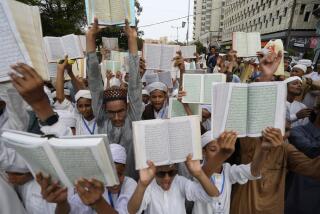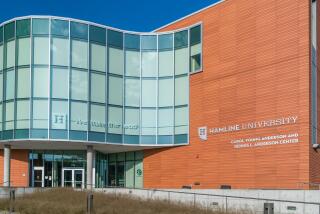The West as scapegoat
- Share via
WHY ARE SO many Muslims so enraged by a handful of cartoons published in an obscure Danish newspaper? It’s not enough to point out how the governments of Egypt, Syria and Iran are stoking the protests in a cynical ploy to deflect Western pressure for democratic reform and to curry favor with Islamic radicals. Their strategy wouldn’t be so successful if it didn’t resonate with deeply ingrained attitudes among the Muslim multitudes.
I got an earful of those views last week in Kuala Lumpur while attending a conference sponsored by New York University and the Malaysian Institute of Diplomacy and Foreign Relations. The ostensible subject was: “Who Speaks for Islam? Who Speaks for the West?” We never did answer those questions, but the infidel attendees did get a red-hot blast of indignation from the Muslim participants, who hailed not only from East Asia but also from Europe, North America, Africa, the Middle East and South Asia.
Even though all of the Muslim delegates were intellectuals, activists, politicians and other movers and shakers, they resonated with the rage of the dispossessed. With considerable justification, they fulminated against the backwardness of the Islamic world compared to the West. With considerably less justification, they blamed their frustrations on the West.
If only I had a ringgit for every time some delegate complained that the plight of the Palestinians showed the world’s anti-Muslim bias. One attendee even had the gall to claim that Israel is allowed to violate U.N. resolutions while no Muslim state has that luxury -- at the very moment Iran is thumbing its nose at the United Nations! This was coupled with ritualistic denunciations of other anti-Muslim offenses -- from the real (Russian repression in Chechnya) to the farcical (a Pakistani academic blamed the CIA for creating Islamic fundamentalism in his country).
Naturally the United States got scant credit (except from one Bosnian) for repeatedly waging war to free Muslims from oppression. Instead of being thanked for saving Muslims from genocide in places such as Kosovo, the U.S. was denounced for committing genocide against them.
Other complaints abounded -- the global financial system is biased against Muslim countries such as Indonesia (which was hurt by the 1997-98 Asian financial crisis); the propagation of knowledge is dominated by American universities such as Harvard and Yale; the U.N. Security Council has no permanent Islamic member; and on and on.
Of course, blaming the U.S. for the world’s ills is not an exclusively Islamic phenomenon, as one non-Muslim attendee from Austria proved by complaining that Hollywood had destroyed the European film industry. (Pity those poor Europeans -- forced by evil American capitalists to watch movies they hate.) But such whininess is particularly pronounced among the large number of Muslims who have never come to grips with the subservient position they have occupied in world affairs since Napoleon’s 1798 invasion of Egypt.
IN RECENT years, some Muslims, notably the authors of the 2002 U.N. Arab Human Development Report, have been acknowledging internal problems -- a lack of freedom, honest government, gender equality, scientific research and education -- that have turned their societies into global also-rans. But in Kuala Lumpur there wasn’t much introspection in evidence. Most attendees -- and I suspect their views are broadly representative of the Muslim world as a whole -- preferred to rant against supposed Western oppression.
The cartoon brouhaha not only confirms this victimization legend, it assuages the shame many Muslims feel over the atrocities committed in their name by Osama bin Laden & Co. To hear many Muslim attendees talk, you would think there is no difference between a cartoonist who injured no one physically and terrorists who kill thousands of innocent people. The trope of the conference seemed to be: “We have our extremists ... and you have yours.” Former Iranian President Mohammad Khatami took this argument to its logical conclusion by equating American neoconservatives with Al Qaeda. As if Paul Wolfowitz were plotting to crash hijacked aircraft into Tehran office buildings.
The most depressing aspect of the whole cartoon affair is not the intolerance for press freedom exhibited throughout Muslim lands. It is the willingness of so many Muslims -- even those who would never burn a consulate or threaten a newspaper editor -- to scapegoat the West for their own failures. Muslim nations will never make any progress unless they stop focusing on the offenses, real or imagined, visited upon them by the outside world and start looking within for what ails them.
More to Read
Sign up for Essential California
The most important California stories and recommendations in your inbox every morning.
You may occasionally receive promotional content from the Los Angeles Times.











